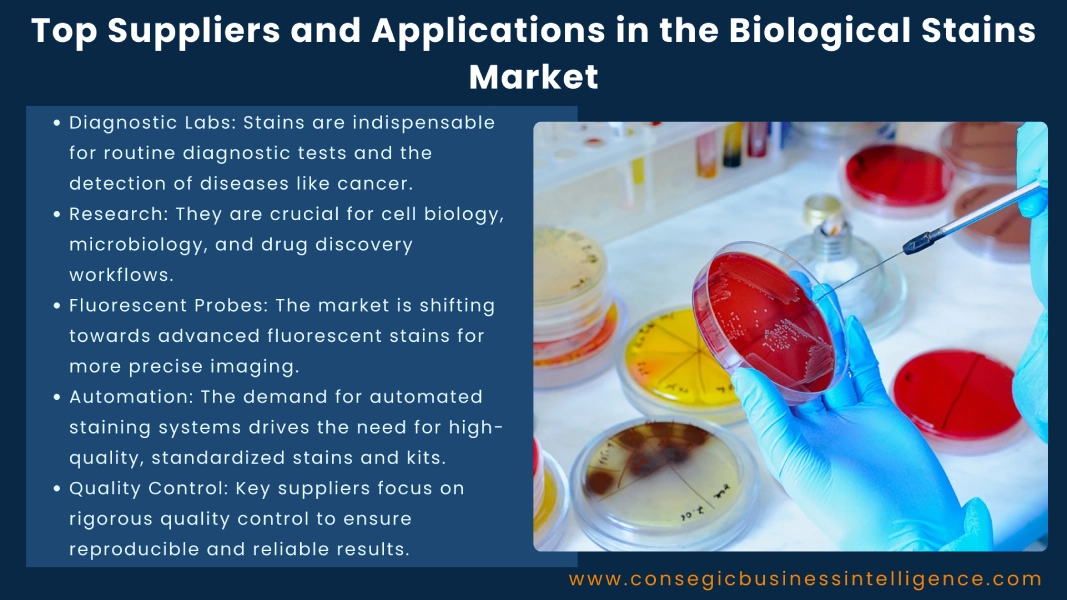Top Suppliers and Applications in the Biological Stains Market
Biological stains are vital tools in life sciences, used to visualize and analyze cells, tissues, and microorganisms in both clinical and research settings. From classical dyes like hematoxylin and eosin (H&E) to advanced fluorescent probes, these reagents underpin diagnostics, drug discovery, microbiology, and molecular biology workflows. The biological stains market continues to grow as new imaging technologies and automation platforms demand higher-quality, standardized stains.

In this blog, we look at the global leaders in the market and the its applications driving adoption worldwide.
Top Global Suppliers in the Biological Stains Market
- Thermo Fisher Scientific
Thermo Fisher is one of the largest suppliers of biological stains, offering a comprehensive range of histology stains, fluorescent dyes, and immunohistochemistry reagents. With global distribution and advanced R&D, the company provides solutions that serve both clinical pathology labs and cutting-edge research facilities. Its integration of stains with automated platforms makes it a leader in workflow efficiency.
- Merck KGaA
Merck is a trusted supplier of histological and cytological stains, fluorescent reagents, and high-purity solvents. Known for consistency and regulatory compliance, Merck supports clinical diagnostics, microbiology, and research applications. Its strength lies in offering both traditional dyes and innovative fluorescent stains, making it a versatile global player.
- Agilent Technologies (Dako)
Through its Dako brand, Agilent is highly recognized in immunohistochemistry and pathology staining. It provides validated stains, chromogens, and automated staining systems widely used in diagnostic labs. Agilent also plays a significant role in companion diagnostics, offering reliable staining solutions linked to targeted cancer therapies.
- Bio-Rad Laboratories
Bio-Rad supplies stains for protein visualization, gel electrophoresis, and blotting workflows, along with reagents for microscopy. Its products are widely used in academic and industrial research labs, valued for reproducibility and compatibility with molecular biology and imaging systems. Bio-Rad’s focus on life science research makes it a key player in the market.
- Abcam
Abcam is a leading supplier of antibodies and conjugated staining reagents for immunohistochemistry, immunofluorescence, and flow cytometry. Its strength lies in providing validated antibody-dye pairs and complete staining kits, enabling researchers to streamline workflows and achieve consistent results across applications.
- Vector Laboratories
Vector specializes in histological stains, detection systems, and chromogenic reagents for microscopy and immunohistochemistry. The company’s products are highly regarded for signal amplification and reliability in academic and clinical pathology labs, positioning it as a go-to supplier for visualization reagents.
- Cytiva
Cytiva supplies a wide range of staining reagents for molecular biology, cell imaging, and microscopy. With strong global distribution and partnerships, Cytiva supports both research and clinical workflows. Its portfolio includes stains for nucleic acid visualization and fluorescent probes that align with advanced imaging technologies.
- Bio-Techne (R&D Systems and Novus Biologicals)
Bio-Techne’s brands provide high-quality antibodies, immunoassays, and staining reagents. Their solutions are widely used in translational research, biomarker studies, and immunocytochemistry. With a focus on reproducibility and application-specific kits, Bio-Techne is increasingly important in the research and diagnostics market.
Top 5 Applications of Biological Stains
- Histology and Diagnostic Pathology
Histological stains such as hematoxylin and eosin are the foundation of tissue diagnostics. They allow pathologists to assess cellular morphology, detect abnormalities, and diagnose diseases including cancers and inflammatory conditions. Standardized staining protocols are essential for reproducibility and accuracy in hospitals and diagnostic labs.
- Immunohistochemistry (IHC) and Companion Diagnostics
IHC relies on antibody-linked chromogens and fluorescent dyes to detect specific proteins in tissue sections. It is vital for classifying tumors, predicting treatment response, and guiding targeted therapies. As precision medicine expands, validated stains and automated IHC systems are becoming more important in clinical diagnostics.
- Microbiology and Infectious Disease Testing
Classic stains such as Gram stain, acid-fast stain, and Giemsa remain indispensable in microbiology labs for identifying bacteria, fungi, and parasites. Rapid staining techniques also support infectious disease diagnosis and antimicrobial stewardship, especially in resource-limited healthcare settings.
- Fluorescence Microscopy and Multiplex Imaging
Fluorescent dyes and probes are used to label multiple targets in cells and tissues, enabling advanced imaging techniques like multiplex immunofluorescence and spatial biology. These applications are growing rapidly in research and translational medicine, driving demand for photostable, high-resolution stains.
- Flow Cytometry and Cell Analysis
Biological stains and fluorophore-conjugated antibodies are essential for identifying and characterizing cell populations in flow cytometry. They are used in immunology, hematology, stem cell research, and cell therapy monitoring. This application requires highly validated and standardized stains for accurate results.
Conclusion
The biological stains market is anchored by leading suppliers such as Thermo Fisher, Merck, Agilent, Bio-Rad, Abcam, Vector Laboratories, Cytiva, and Bio-Techne. Their global presence, quality reagents, and integration with diagnostic and research workflows ensure they remain central to the industry.
On the application side, histology, immunohistochemistry, microbiology, fluorescence microscopy, and flow cytometry continue to dominate demand. As imaging technologies, automation, and precision medicine advance, suppliers that deliver reliable, validated, and innovative staining solutions will remain at the forefront of this evolving global market.
